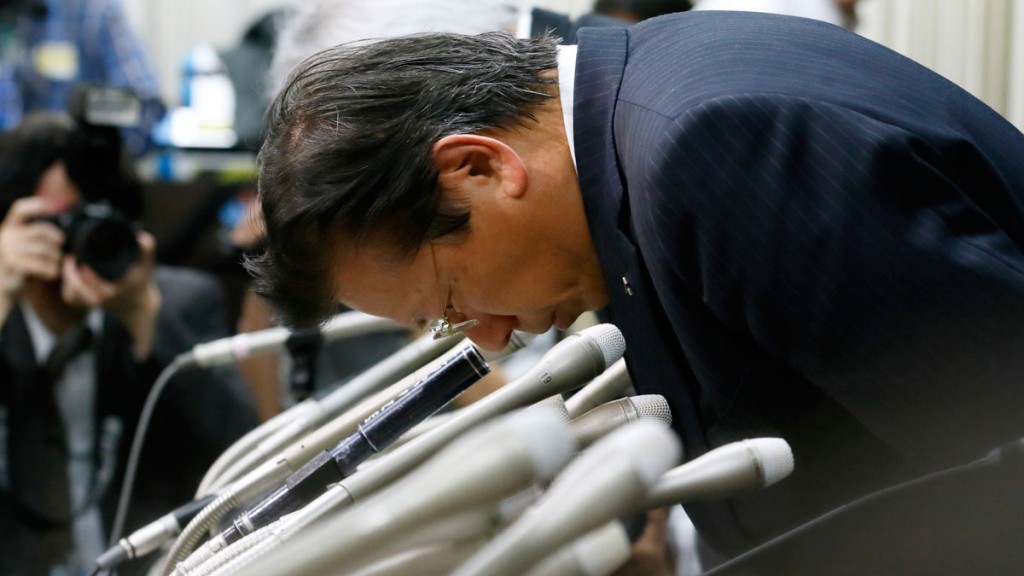
Every smog cloud has its silver lining. Volkswagen is still on the hook for installing “cheat devices” – software that made its cars appear cleaner than they were – but it’s now emerged that it’s not the only one to play dirty. To one degree or another, it seems a number of car brands have been playing fast and loose with the rules.
The car industry won’t be able to forget last week fast enough. We saw the bosses at Japanese car firm Mitsubishi hang their heads in shame. Evidence that they had falsified fuel economy data was uncovered in raid on their factory in Okazaki, central Japan. The government has given them until tomorrow to explain themselves.
Closer to home, French car maker Peugeot Citroen was on the receiving end of an unexpected visit from the authorities. It claims it’s done nothing wrong, echoing Renault which was raided in January.
Also last week, 37 car models in Britain and 56 in Germany were found to exceed EU standards on air quality and pollution when tested.
And at the weekend, the Germans were pointing accusing figures at the Italians after their tests suggested “some Fiat vehicles showed irregular diesel exhaust pollution”, Reuters reported. The Italians have yet to respond.
That’s a lot horn-blowing in the space of just a few days. So what on earth is going on?
We told you so
If only you had been listening to what we were trying to tell you, say the environmentalists. “This confirms what experts have been saying for years”, Oliver Hayes of Friends of the Earth said. “Deadly emissions are far higher in the real world than in controlled tests in the lab.” And there lies the rub.
Car manufacturers and governments have been under pressure to lower levels of climate-changing carbon dioxide. Diesel engines release less of the gas than petrol engines, but are more polluting in other ways. Nevertheless, drivers in many EU countries have been nudged towards diesel vehicles as the tax on diesel is less than on petrol in most of Europe (though not in the UK), explains The Guardian’s Fiona Harvey.
“Engine management systems have become standard across the industry, and these new tests make it clear that they are there for one purpose: to improve the performance of the car, even if that comes at the expense of those breathing in the air from their exhausts…”
The car makers aren’t the only culprits, then. The regulators are to blame too. As Jonathan Ford notes in the FT, “dieselgate” has been a welcome wake-up call to the EU regulators to make the “test scenarios more lifelike”. So, in true bureaucratic fashion, they go and make things worse.
Caveats and exceptions to the rules have meant that their renewed sense of realism has been “matched by a willingness to make regulations, that already bear a resemblance to a Swiss cheese, even more porous”.
Maybe that’s not too surprising, says Ford. After all, “no politician wishes to be seen to undermine the competitiveness of an industry that employs 12.1 million people and accounts for 7% of the EU’s manufacturing jobs”. If European governments actually start enforcing the rules, the fear is companies in China and India might gain the inside line.
All this just goes to show that when relying on authorities to enforce the rules on emissions and pollution, we had better not hold our breath. Or maybe we should.
The electric revolution
You don’t need to be an expert in PR to realise that none of this is reflecting too well on traditional motors. So maybe as investors we should turn our attention to the cars of the future. That means electric.
As MoneyWeek regular Bengt Saelensminde noted in October, “Recognising that diesel will never be truly green… [Volkswagen had] brought forward plans to electrify millions of vehicles”.
Bengt’s a long-term fan of lithium, the element that goes into the batteries in electric cars. (Check out his article in MoneyWeek magazine from September to find out how he’s playing the electric revolution.)
But who knows? Perhaps in the future, electric cars will even be powered by solar rays. The age of the “sun guzzler” could soon be upon us.